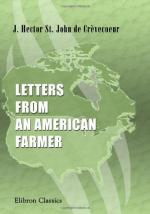After a foreigner from any part of Europe is arrived, and become a citizen; let him devoutly listen to the voice of our great parent, which says to him, “Welcome to my shores, distressed European; bless the hour in which thou didst see my verdant fields, my fair navigable rivers, and my green mountains!—If thou wilt work, I have bread for thee; if thou wilt be honest, sober, and industrious, I have greater rewards to confer on thee—ease and independence. I will give thee fields to feed and clothe thee; a comfortable fireside to sit by, and tell thy children by what means thou hast prospered; and a decent bed to repose on. I shall endow thee beside with the immunities of a freeman. If thou wilt carefully educate thy children, teach them gratitude to God, and reverence to that government, that philanthropic government, which has collected here so many men and made them happy. I will also provide for thy progeny; and to every good man this ought to be the most holy, the most powerful, the most earnest wish he can possibly form, as well as the most consolatory prospect when he dies. Go thou and work and till; thou shalt prosper, provided thou be just, grateful, and industrious.”
HISTORY OF ANDREW, THE HEBRIDEAN
Let historians give the detail of our charters, the succession of our several governors, and of their administrations; of our political struggles, and of the foundation of our towns: let annalists amuse themselves with collecting anecdotes of the establishment of our modern provinces: eagles soar high—I, a feebler bird, cheerfully content myself with skipping from bush to bush, and living on insignificant insects. I am so habituated to draw all my food and pleasure from the surface of the earth which I till, that I cannot, nor indeed am I able to quit it—I therefore present you with the short history of a simple Scotchman; though it contain not a single remarkable event to amaze the reader; no tragical scene to convulse the heart, or pathetic narrative to draw tears from




